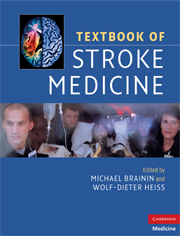Book contents
- Frontmatter
- Contents
- Preface
- List of contributors
- Section I Etiology, pathophysiology and imaging
- Section II Clinical epidemiology and risk factors
- Section III Diagnostics and syndromes
- 8 Common stroke syndromes
- 9 Less common stroke syndromes
- 10 Intracerebral hemorrhage
- 11 Cerebral venous thrombosis
- 12 Behavioral neurology of stroke
- 13 Stroke and dementia
- 14 Ischemic stroke in the young and in children
- Section IV Therapeutic strategies and neurorehabilitation
- Index
- References
13 - Stroke and dementia
from Section III - Diagnostics and syndromes
Published online by Cambridge University Press: 05 May 2010
- Frontmatter
- Contents
- Preface
- List of contributors
- Section I Etiology, pathophysiology and imaging
- Section II Clinical epidemiology and risk factors
- Section III Diagnostics and syndromes
- 8 Common stroke syndromes
- 9 Less common stroke syndromes
- 10 Intracerebral hemorrhage
- 11 Cerebral venous thrombosis
- 12 Behavioral neurology of stroke
- 13 Stroke and dementia
- 14 Ischemic stroke in the young and in children
- Section IV Therapeutic strategies and neurorehabilitation
- Index
- References
Summary
For every three people currently living in Western countries, at least one will develop dementia, stroke or both [1,2]. Stroke is the leading cause of physical disability in adults: of one million inhabitants, 2400 people have a stroke every year, of whom more than 50% will die or become dependent 1 year later [3]. Dependency after stroke is often due to dementia [4]. Even in stroke survivors who are independent, slight cognitive or behavioral changes may have consequences for familial and professional activities [5]. Dementia is also frequent in Western countries, especially after the age of 75 years, where its prevalence is close to 18% [6]. About 40% of demented people live in an institution, and among institutionalized residents two-thirds are demented [6]. Therefore, the economic burden of dementia is important.
Stroke and dementia are both frequent and their relationship is more complex than being just a coexistence of two frequent disorders. Besides being a potential cause of dementia, and a factor that negatively influences the time-course of Alzheimer's disease (AD), stroke also shares many risk factors with AD, such as increasing age, arterial hypertension and ApoE4 genotype [7]. The prevalence of stroke and of dementia is likely to increase in the coming years, because of the decline in mortality after stroke [8] and the aging of Western populations [9]. Therefore, the burden of stroke-related dementia is also likely to increase in the future [5].
- Type
- Chapter
- Information
- Textbook of Stroke Medicine , pp. 194 - 202Publisher: Cambridge University PressPrint publication year: 2009



